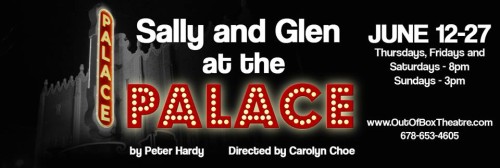 Essential’s artistic director, Peter Hardy, doesn’t just work hard to give Georgia playwrights a voice. He’s also a playwright himself. A play of his is opening this weekend, in fact: read on as he shares some reflections on SALLY AND GLEN’s journey to the present day:
Essential’s artistic director, Peter Hardy, doesn’t just work hard to give Georgia playwrights a voice. He’s also a playwright himself. A play of his is opening this weekend, in fact: read on as he shares some reflections on SALLY AND GLEN’s journey to the present day:
SALLY AND GLEN AT THE PALACE is a very special play for me, a deeply personal one, and it took a long time to grow up. When I was in college at UNC in Chapel Hill, North Carolina, I worked at a movie theater from 1972-1976, and years later (sometime in the early-mid 1990s) I was walking on the beach and thinking back to my college years, and found that working in that lobby was the main thing I remembered about that time – it was the first thing that came to mind . In hindsight, it felt as though I’d spent those years trying to hide away from life, losing myself in the hundreds of films I would watch (in local theaters, on campus and on TV). And, walking on that beach, I thought about writing a play about a guy and a girl working in the lobby of such a theater. Probably, I thought, a light, comic one-act.
Nothing more came of this idea, for a while, and I was writing other things. Then, one morning around 1998 or so, I woke up from a dream about that movie theater, and thought of a string of incidents that would become the last part of SALLY AND GLEN, and knew that I had something. Within a year or so, I’d written the first draft, and the feedback I got from friends and family was very encouraging. It was a two-character play, and I’d invite pairs of actor friends over to my apartment to read it for me. Then, in the summer of 2000, my friend Ellen McQueen directed a workshop production of it at the Mountainside Theater in North Carolina.
Ellen, who knows me very well, helped me to see the play more clearly, and little changes were made. It was next given a reading at the New Southern Theater Festival in Nashville, where it won a playwriting award, and then it was produced in Tallahassee at Theatre Southeast, the professional summer theater program of Florida State University. With that director’s encouragement, I made a few more changes, mostly cuts. That was the summer of 2001, and this would be the only production of the play that my parents, who’d believed in it so much, were ever able to see.
The play seemed to work fairly well, and got fairly good response, but it didn’t seem to be finished, yet. Something about it wasn’t connecting to people – they still seemed to be confused by the way it went from a light, mostly comic first act to a much more serious and emotionally wrenching second act. But it was an award-winning script that had received its first professional production, so I started to send it around to places, both here in Atlanta and around the country. It was a single-set two-character comic drama, and it got some complimentary rejection letters, but nobody was biting. And some years went by as I wrote other things.
In the meantime, I was also producing the annual Essential Theatre Festival, and by 2010 we were doing pretty well, had built up a good reputation for producing new plays, and could afford better production values. So I decided it was time to bring SALLY AND GLEN to what was now my home town, so it could be seen by new audiences, including a lot of people who knew me. Which was a little scary – as I said, this is a very personal story I was telling. But my friend Ellen McQueen was directing again, and we got two wonderful actors (Kate Graham and Jacob York), and rehearsals got underway. And something still wasn’t working.
It all came down to one particular place in the play, a crucial moment of deep emotional confusion. I’d come to understand a lot about the play (and about where it came from) over the years, and I knew what I was writing about – but how do you communicate and illuminate the experience of extreme confusion and disorientation without (1) leaving the audience confused or (2) spelling it out in cut-and-dried explanatory terms? So I worked and wrestled with myself, and walked around my apartment searching and weeping, and I came up with about 20 new words for Sally to say, at that crucial point – and then, six more words for her to say, at the very end, and I handed this over to Ellen and the actors. And all the confusion seemed to vanish from the play. The dramaturg Michael Evenden (a professor at Emory) saw a run-through and immediately knew something important that had been changed.
The production opened and the play got the best reviews of my life, and the biggest outpouring of love from audiences for any work I’ve ever done. So many people told me how much they’d loved and enjoyed it, and one fellow told me it had changed his life. Nobody seemed confused about the play anymore, and everybody seemed to understand what it was I’d been trying to express.
Was the play finally finished? Not quite. Watching the 2010 production, night after night, there were two short scenes in the first act that always felt to me like they didn’t belong – on their own they were amusing and interesting, but they slowed things down and didn’t really contribute to the overall story. So I cut them.
Now the play’s about to open again, in a new production at Out of Box Theater in Marietta, and I couldn’t be happier that new audiences will have a chance to see it. I attended one early rehearsal of this production, and a run-through about a week before their opening, and I told them a few things and answered a few questions. But that was all I had to do – it was clear to me that the actors and the director understood the play, that they “got” it. (And they seem to love it as well, which makes me very glad.)
So, after fifteen-some years, SALLY AND GLEN AT THE PALACE seems to be ready to step out into the world on its own, without me hovering over it as a guardian or a protector. Which, of course, is what all playwrights should hope for their work.
*SALLY AND GLEN AT THE PALACE opens this Friday, June 12, at Out of Box Theatre in Marietta, and runs through June 27. Click here for more information.

